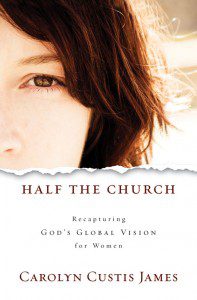 If, like me, you were fascinated by Half the Sky, Sheryl WuDunn and Nicholas Kristof’s gripping account of women’s oppression and liberation around the world, you may be interested in Half the Church, Carolyn Custis James’s new book on a global understanding of Christian women. The bits I’ve read show that James writes from a moderate to conservative evangelical perspective, which means that she’s a good deal more conservative than I am and I sometimes disagree with her. (Why would anyone need to spend a whole chapter proving that women are created in the image of God? The sad truth is that James needs to because many of her readers still need to be persuaded of women’s fundamental worth.) Even though I don’t always agree (or else I agree and wonder why some of these questions about women’s value still manage to rear their ugly heads), I’m truly pleased to see someone from that camp tackle important issues like human trafficking, sexual slavery, and honor killings. –JKR
If, like me, you were fascinated by Half the Sky, Sheryl WuDunn and Nicholas Kristof’s gripping account of women’s oppression and liberation around the world, you may be interested in Half the Church, Carolyn Custis James’s new book on a global understanding of Christian women. The bits I’ve read show that James writes from a moderate to conservative evangelical perspective, which means that she’s a good deal more conservative than I am and I sometimes disagree with her. (Why would anyone need to spend a whole chapter proving that women are created in the image of God? The sad truth is that James needs to because many of her readers still need to be persuaded of women’s fundamental worth.) Even though I don’t always agree (or else I agree and wonder why some of these questions about women’s value still manage to rear their ugly heads), I’m truly pleased to see someone from that camp tackle important issues like human trafficking, sexual slavery, and honor killings. –JKR
How did you come up with the title Half the Church?
Choosing a title for a book can be one of the most difficult parts of writing. My editor and I tossed around different possibilities. Nothing seemed right. The focus of my writing has been on understanding the Bible’s message for women and exploring the potential impact of women’s contributions invested or held back. I have often said, “Women make up half the church and more in many parts of the world.” When my editor heard me say that, she said, “There’s your title!”
This book builds on what I’ve written in my other books and puts in a single volume what I’ve been learning as I’ve researched God’s vision for his daughters. But this book takes things further by expanding the discussion of God’s vision for his daughters into the global arena (where it belongs) and at the same time responding to the legitimate challenge posed in Half the Sky for the church to engage the global crisis impacting millions of women and girls.
What authors and books inspired you to consider the oppression of women worldwide and to craft a Gospel response?
Nine Parts of Desire (Geraldine Brooks), Reading Lolita in Tehran (Azar Nafisi), Three Cups of Tea (Greg Mortenson), The Natashas (Victor Malarek), Half the Sky (Sheryl WuDunn and Nicholas Kristof), The Kite Runner (Khaled Hosseini), and Things as They Are (Amy Carmichael).
You argue that the Bible calls women the “image bearer of God.” How does this provide a foundation of value for women?
I doubt there is a more important fact to know about ourselves than this. Being God’s image bearer means we are called to reflect God in this world. We are his representatives. We speak and act on his behalf. We are his eyes, his ears, his hands, his heart. People are supposed to learn what God is like by rubbing shoulders with us, and he desires to see the clearest reflections of himself in us. It means it is not possible for any woman to live an insignificant life. This gives us an indestructible and unchanging identity and purpose, no matter how our stories play out. What is more, it means before God created a single human being, he threw open the door and put the welcome mat out for a relationship with himself, for we can’t become like someone we don’t know.
You believe that significant numbers of evangelical Christians are still uncomfortable applying the word “leader” to a woman. Does this mindset allow women to let their gifts lie dormant?
Some are uncomfortable applying “leader” to any woman. Others are selective in applying the label “leader” to certain Deborah-like women, but not to every woman. But being God’s image bearer implies all of us bear leadership responsibilities. We may not have followers or an organization behind us, but as God’s image bearers what happens in God’s world is our business, and he has placed responsibility on us to act on his behalf.
You talk in the book about the definition of “ezer,” the Hebrew word that’s translated “helper” in English. How did this word’s meaning radically change your view of women?
The Hebrew word ezer appears in the Old Testament twice for the woman in Genesis 2, three times for nations Israel turned to for military help, and sixteen times for God, as Israel’s helper in time of distress. That resulted in upgrading “helper” to “strong helper.” I looked up all those verses and discovered ezer always appears in a military context, including Eden, where an Enemy was about to launch a major attack. Those findings are in my book. Add to that the fact that military language is used elsewhere in Scripture for women (Proverbs 31, Ruth 3, and Ephesians 6), I concluded that the ezer is a warrior for God’s purposes. This view of the ezer elevates both our concept of the woman and also of the man. God provided the kind of significant help he needed, not because the man was lacking or inept, but because God was commissioning the man with the most ambitious enterprise imaginable—to rule and subdue the whole earth with an Enemy on the loose. God provided real help—an ezer-warrior to stand in the battle with the man.

